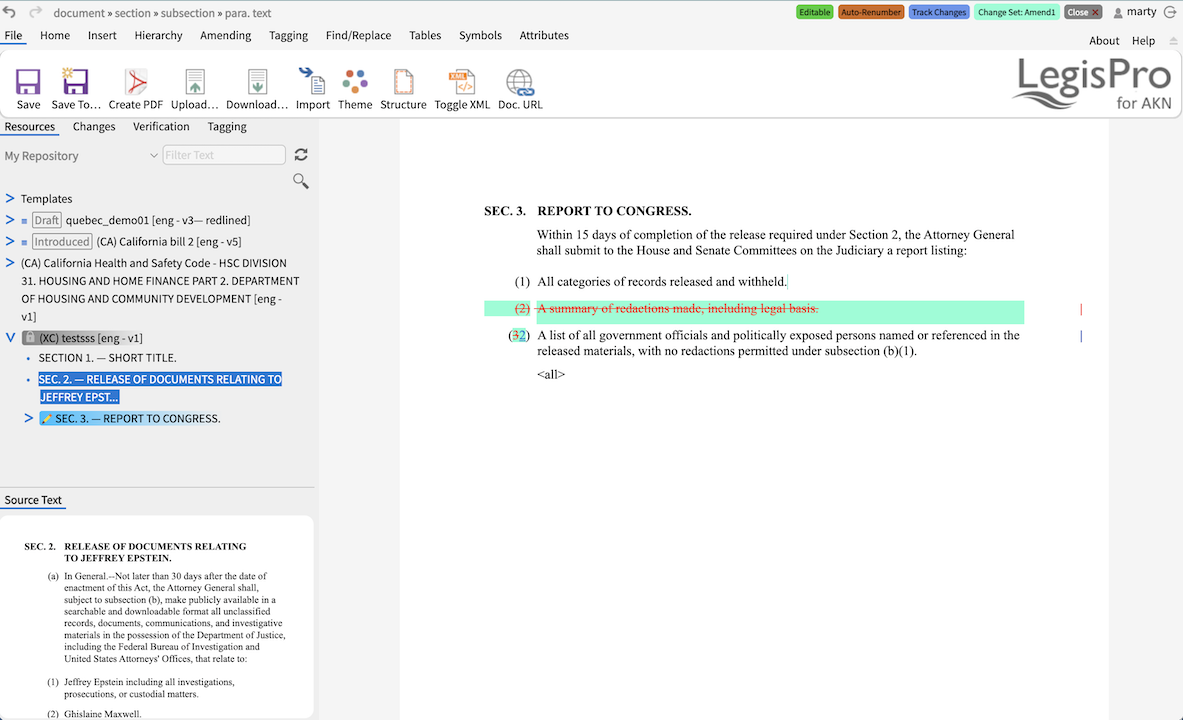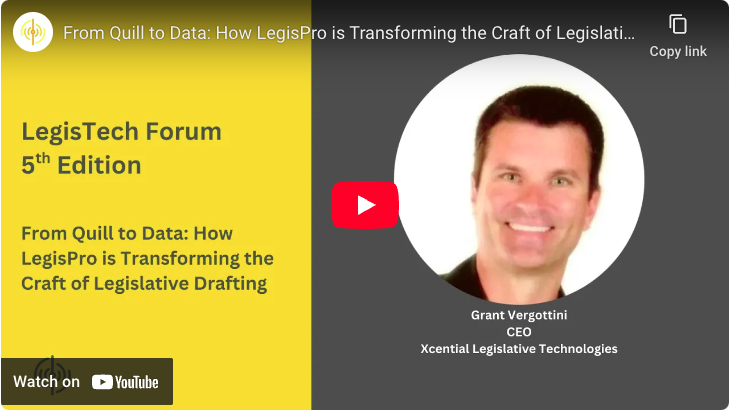The Power of Open Standards
NovaWorks’ Jonathan Ruckert talks about the importance of implementing ‘common data models’ in the modernization of legislative systems. It’s the key to greater transparency, accuracy and automation.
February 8, 2022


Digital Transformation for Legislatures and Parliament:
NovaWorks' Two-Decade Journey
We recently caught up with Jonathan Ruckert, founder and CEO of NovaWorks, which is partnering with Xcential to deliver modern, data-first legislative drafting tools to legislators in Australia, the U.S. and beyond. This transcript has been edited for clarity.
Hudson Hollister
Jonathan Ruckert, founder and CEO of NovaWorks, thank you so much for spending some time to talk to our Data First newsletter.
Jonathan Ruckert
Excellent. We’re very glad to be here and looking forward to having a chat.
Hudson Hollister
I would love to hear the story of NovaWorks, how it began, the original vision, and perhaps how you might have deviated from the original vision over the years.
Jonathan Ruckert
Yeah, it’s essentially one story. I founded NovaWorks back in 2004. And we got into the parliamentary business, winning a tender here in Australia.
And from that point, we’ve really been about transformation from WordPerfect and Word to cutting-edge web applications, transcription management, committee management, and a whole range of other things.We did that for one of our legislatures back in 2004-2005, and from that, we really found a market in other jurisdictions, especially around Australia and APAC, hankering for those sorts of technology advancements.When we look at parliaments back in the 2000s, they all had their own little data silos, they all had [paper processes], they all controlled the sharing of knowledge. Everyone had to copy and paste [legislative] information or re-type it. Very, very inefficient.
Hudson Hollister
How did you first get into the notion of managing a legal code as [digital] code?
Jonathan Ruckert
It was a bit of an evolving journey for us. [Originally] we only [handled] a sort of very small snippet of what Parliament actually did back then, maybe 10%.And then we realized: if you actually voted on something within the chamber, for legislation or bills, [with a code managed as data first] we could actually reuse that in another department.From that point, we grew our platform and grew our product set to really cover 90 to 95 percent of the functions of Parliament internally, which is obviously quite exciting. From [there] we went from the state legislative bodies, federal governments now, and internationally as well.There are common themes when we look at data and analytics. Even though every single parliament and jurisdiction is different in its own right, they have different workflows, or they have different fundamentals, you're still dealing with legislation, we're dealing with bills, we're dealing with constituents, we're dealing with members, we're dealing with citizens. All parliaments and legislatures are there to provide a legal framework for the country or state. Therefore, to transform legislative authority, to break down data silos, for any parliament or legislature, you need to apply a common data model, your central source of truth. That’s our vision in what we’ve been working on with parliaments.The centralization of legislative data, shareable internally and externally, brings automation. It’s shared externally with legal firms, it’s shared externally with citizens. They can do data mining or cross voting patterns. It’s about transparency and openness.If you look at transcripts of parliamentary proceedings, if you look at the journals, if you look at all the debates, it’s just in a written PDF. So how do you actually make it more accessible? Standardized, open data sets, which anybody can actually use. It’s all public information at the end of the day.
Hudson Hollister
Tell me about the standardized structures which you can apply to make legislative information open.
Jonathan Ruckert
We’ve actually published a whole series of articles and documents effectively on GitHub using common and open schemas. When we look at onboarding parliaments into this sort of framework, with open and nonproprietary schemas they can understand the data and they’re not necessary then locked into using NovaWorks permanently, and that’s another key benefit.
Hudson Hollister
How do you explain to parliaments, including the leadership, legislative support staff, and legal support staff, what an open schema is?
Jonathan Ruckert
You don’t want to go technical. I tell you that you don’t want to go technical!Instead, it’s all about ease of access to that information. Open and nonproprietary schemas are created through collaboration between multiple parliaments and multiple jurisdictions.Parliaments are not software development companies. Their purpose is to govern their jurisdictions effectively. So you need to make it easy.In our sales pitches, we talk about our breadth of experience working with parliaments around the world. Each of them has different unique attributes, but they have major commonalities. The majority of governments allow you to petition them, for instance. The key messaging is that a lot of parliaments assume they have to invent all their technology and processes themselves. We can help provide a level of comfort by redeploying what has worked elsewhere.
Sonya Aboudargham, Chief Marketing Officer
One thing I’d add: Jonathan, it’s certainly my experience in working with you is that NovaWorks is very customer driven. All the features that are added into the product are really coming out of customer demand. It’s not a case of “this is what we think you need.” Instead, we respond to specific problems, build those into the solutions, and they become features.
Jonathan Ruckert
And we’ve developed a community hub as well, where all the parliaments can submit their information and ideas, and we then triage.And so we can see common themes around parliaments’ problems and our solutions and combine our solutions into a product set, instead of actually forcing parliaments down a specific route.
Hudson Hollister
I want to leave you with one final question. Much has been written about algorithmic regulation, or the notion of automatically executable legal rules. Do you think that is already happening? If not, will we know when it's happening?
Jonathan Ruckert
I think there is a level of it occurring in some respects, around such things as amendments to common clauses, or changes that automatically populate entire slabs of content.Think of how if you type emails now in Microsoft Outlook, it will try to auto-predict what you’re actually typing and give you sentences to fill in. We can use that similar technology to give parliaments sentence-driven content, but not create full-blown paragraphs.And then you’ve got a chance to actually review that, especially with the nature of legislation and bills: everything hangs on those words, you know.I think it’s evolving over the next couple of years, but whether legislative authorities have actually got the appetite to give it a go is going to be the interesting question.
Hudson Hollister
Jonathan, thank you so much for spending time with us.
Jonathan Ruckert
Thank you.








